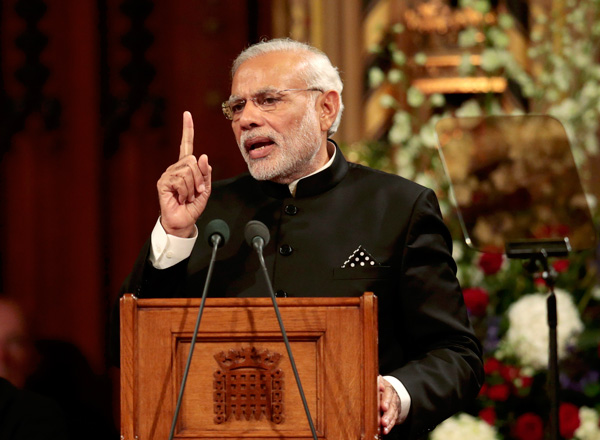Modi's nuclear deal with Britain is hollow, but quite toxic

The deal
- Narendra Modi has just inked a nuclear deal with Britain
- He called it symbol of \"our resolve to combat climate change\'
- The deal comes when the British nuclear industry is in a crisis
The danger
- Britain has little to offer India in terms of nuclear energy
- It reinforces the myth that n-power is green, climate-friendly
- India is missing the shift from n-power to renewable energy
More in the story
- India is among the few nations on a nuclear shopping spree in the post-Fukushima world. Why?
- Nuclear energy isn\'t a solution to climate change. Why is the industry peddling this myth?
Many of Narendra Modi's foreign trips have featured nuclear cooperation agreements with host nations. It's ironic since the BJP had fiercely opposed the previous regime's nuclear deal with the US when it was in opposition.
Keeping to the script, Modi has just announced a civilian nuclear agreement with Britain.
The pact is largely symbolic. But it's dangerous.
Spent force
Britain has little to offer India when it comes to nuclear energy. Its nuclear industry is facing a terminal crisis. The two power plants planned in Hinkley Point have been plagued by escalating costs, forcing the investors to abandon the project, as well as serious design risks.
Britain's new nuclear plants in Hinkley Point are plagued by escalating costs, serious design risks
The World Nuclear Industry Report, 2015 concludes that Britain's nuclear industry has been decisively overtaken by the renewable energy sector, for a variety of reasons, including the increasingly adverse economics of nuclear energy and growing competitiveness and efficiency of renewable energy sources.
Indeed, Cameron's nuclear deal with China last month has come under severe criticism for being a desperate, expensive and dangerous move.
So, for India, the deal with the UK is little more than a symbolic prize.
In the post-Fukushima world, India is one of the few nations on a nuclear shopping spree. Not because it's following some rational and openly debated energy policy but because the deals imply recognition of the country's status as a nuclear weaponsstate.
India was slapped with a global nuclear embargo in 1974 when it used the material and technology imported from the West "forpeaceful purposes" to fashion its first nuclear explosion device.
The restrictions were lifted in 2005, after the US, in an unprecedented move, forced the Nuclear Suppliers Groups and the International Atomic Energy Agency to exempt India from their rules disallowing nuclear commerce with non-NPT countries.
The India-US deal was strongly criticised internationally, both for effectively rewarding a nuclear proliferator and for being a desperate move to open a new market for the Western nuclear industry, which has been in steady decline since the late 1990s.The decline has since been exacerbated by the 2011 Fukushima disaster.
So, why is the nuclear deal with Britain dangerous if it's merely a symbolic bargain?
Unclean motive
The joint statement issued on 13 November by Modi and David Cameron emphatically describes the deal as a symbol of "mutual trust and our resolve to combat climate change".

Photo: Suzanne Plunkett - WPA Pool/Getty Images
It thus peddles the global nuclear industry's myth of nuclear energy being clean and a solution to climate change.
Nuclear energy is not a solution to climate change. It has a large carbon footprint: @pksundaram
The nuclear lobby has been campaigning in recent years to re-fashion the industry as green and renewable - to ensure subsidies and state support as well as positive popular perception.
In the run-up to the Conference of Parties of the UN Framework on Climate Change in Paris next month, the nuclear lobby,such as EDF of France, is trying to sell nuclear power as climate-friendly energy. Under the expiring Kyoto Protocol, nuclear power is excluded from the list of green energy sources and rightly so.
Nuclear power leaves a huge carbon footprint - from carbon-intensive mining and refining of uranium ore to transport and fuel fabrication to manufacturing of high-density concrete and steel for nuclear reactors. And this is without even accounting for the continuous supply of cooling water and long-term handling of nuclear waste.
An assessment of greenhouse gases released from generating nuclear power, done by eminent energy and climate expert Benjamin K Sovacool, pegs the average carbon footprint at 66g CO2/kWh. This is above the limit set by the Committee on Climate Change.
Cheerleaders of nuclear energy, of course, conveniently ignore all this.
Nuclear energy being a solution to climate change is another myth. Those serious about tackling climate change know it's a grave threat and requires immediate action. The time horizon for a real and meaningful response to change - stabilising global surface temperature at under 2 degrees above the pre-industrial average - can't be stretched father than 2050.
Most assessments testify to this. A study by the MIT has shown that for nuclear energy to be a solution in this scenario, it would take no less than 1,000 nuclear power plants, each with a capacity of 1,000-1,500MW.
This is an impossible goal for two reasons. The nuclear industry is in terminal decline globally. And the much-touted "nuclear renaissance" is restricted to developing countries, where expansion would be much slower due to economic, social and technological reasons.
Also, nuclear reactors typically take 12-15 years to build, making investing in renewable energy much more attractive.
Dirty politics
As the Paris conference comes closer, the US too has rallied behind the nuclear lobby. The move is driven by the interests of the country's nuclear vendors as well as the larger agenda to scuttle any meaningful dialogue on climate change.
Modi's zeal to declare nuclear energy as climate-friendly strengths the myth which the world can accept at its own peril.
In India, local communities and activists are protesting against nuclear plants being set up on their land. They have raised a wide array of issues - damage to livelihoods and the environment, inherently unsafe nature of nuclear energy, its adverse economics and undesirability for India's energy future, shoddy safety regulations, an unaccountable nuclear industry.
Add to this the global shift away from nuclear power post Fukushima that India stands to miss due to its nuclear obsession.
Since coming to power, the Modi government has only furthered the UPA's dangerous and anachronistic nuclear policy.
On nuclear liability, fresh environmental assessment of Jaitapur and other projects hurriedly pushed by the UPA, and accounting for concerns of the local people while acquiring land for the projects, the Modi regime has made dangerous and blatantly undemocratic U-turns from even the stance of the BJP itself.
This bodes ill for the country.
The views expressed here are personal and do not necessarily reflect those of the organisation.
First published: 15 November 2015, 1:02 IST






![BJP's Kapil Mishra recreates Shankar Mahadevan’s ‘Breathless’ song to highlight Delhi pollution [WATCH] BJP's Kapil Mishra recreates Shankar Mahadevan’s ‘Breathless’ song to highlight Delhi pollution [WATCH]](https://images.catchnews.com/upload/2022/11/03/kapil-mishra_240884_300x172.png)

![Anupam Kher shares pictures of his toned body on 67th birthday [MUST SEE] Anupam Kher shares pictures of his toned body on 67th birthday [MUST SEE]](https://images.catchnews.com/upload/2022/03/07/Anupam_kher_231145_300x172.jpg)






